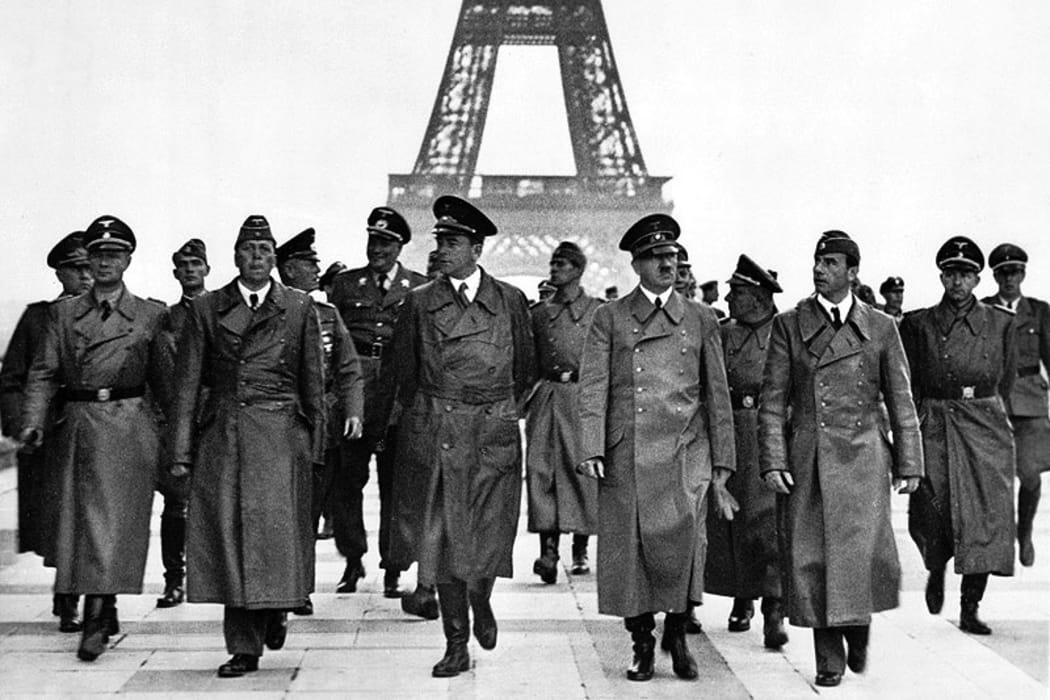The Nazi Party presented themselves as warriors against degeneracy, but a new book shows drug use was rampant in the Third Reich.
A pharmaceutical form of methamphetamine called Pervitin allowed German troops to keep going for three days and nights without sleep, says author Norman Ohler, and by the end of WWII Hitler was a drug-addled wreck.

Photo: wikicommons
Ohler's book Blitzed: Drugs in Nazi Germany tells the story of the Nazi's relationship with drugs, including cocaine, heroin, morphine and, above all, methamphetamines.
The book draws heavily on the papers of Hitler's personal physician, Dr Theodor Morrel, which Ohler came upon in the archives.
Morrel's notes had been scarcely studied by previous historians, he says.
"When you are handed something from the archives you are also given a card saying who has viewed the material before and not many people had looked at Morel's stuff before."
Ohler found Morrel had kept meticulous records detailing the often bizarre and experimental treatments he gave Hitler, whom he referred to as 'Patient A'.
When the Nazis came to power, they banned certain drugs they associated with Jews, such as cocaine and morphine, and punished their use. At the same time, the German-made product Pervitin was seen as beneficial to the Third Reich's aims.

Norman Ohler Photo: supplied
"Methamphetamine was not stigmatised. It was a new on the market and no-one thought of it as an illegal drug, because it simply wasn't illegal - it was just a new invention", Ohler says.
It was so easy to get from pharmacies that the general populace became enthusiastic users. By the late 1930s the Nazi's chief medical officer Leo Conti was concerned.
The 'Health Fuhrer' then tried to crack down on Pervitin to prevent the entire nation becoming addicted. He made it prescription-only, but that didn't apply to the military.
"Soldiers just got it from their medical officer. Conti tried to crack down on that, but the military thought it gave them an edge over the enemy."
Without Pervitin, it is unlikely the Germans would have pulled off their audacious strategy to invade France, Ohler says.
A trio of senior commanders (including Erwin Rommel) convinced Hitler it was possible to invade France through the Ardennes Mountains - and that a swift three-day campaign would catch the Allies off guard.
It was Pervitin that allowed the German troops to keep going.
Hitler's personal doctor Morell was no fan of Pervitin, however.
"He called it the "whip for the horse and not oats". He wanted to give Hitler something beneficial to his health."
So a daily regimen of injections started and Hitler came to rely on them. Initially, the shots were fairly innocuous but gradually became more narcotic in nature.
"For the first couple of years, it was vitamins and glucose in high doses and intravenously. So Hitler gets addicted to these daily injections. He thinks with them he's always up to speed."
Morell then started to fill the Fuhrer's syringe with hormones and various concoctions he designed himself, using the Nazi leader almost as a guinea pig, which he was seemingly happy to be.
As Hitler's health worsened, Morell started giving him daily shots of Eukodel, a powerful opioid, as well as cocaine - what Ohler calls "the Fuhrer's speedball".
Hitler's drug use escalated after an attempt was made to kill him with a bomb, he says.
"It's been a bit of a mystery up until now why Hitler deteriorated so quickly. After the bomb attack, he goes downhill. The propaganda saying he was unharmed was not true - he was quite severely injured and psychologically injured.
"He never really recovers and he takes huge amounts of painkillers and cocaine and other drugs from July '44 for the next six months.
No-one would not deteriorate after such a drug binge."
By 1945, Hitler was described as a wreck - his gums drying, his teeth falling out and his brain irreversibly damaged.
He also had tremors - possibly the result of an RAF bomb raid which wiped out the Eukadol factory and meant supply of the drug effectively dried up.
Those tremors were likely caused by opioid withdrawal, Ohler says.

